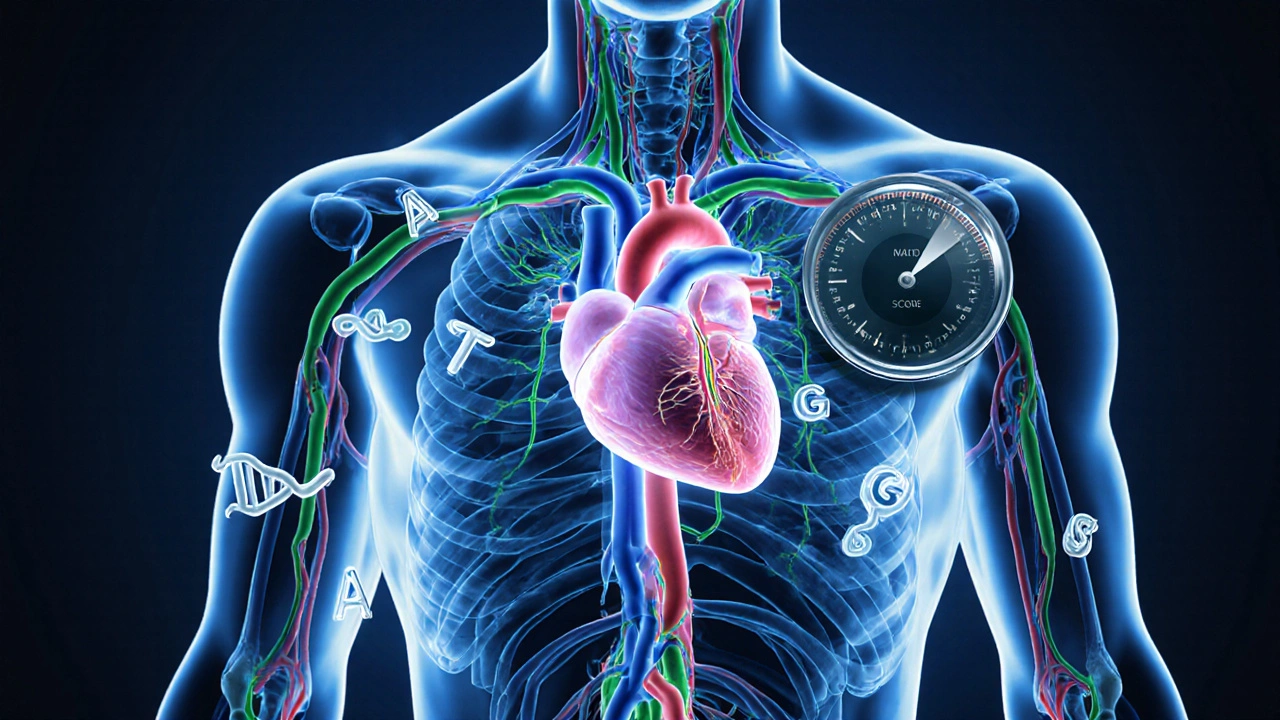Genetics and Hypertension: How Your DNA Affects Blood Pressure Risk
 Sep, 26 2025
Sep, 26 2025
Genetics in Hypertension is a field that investigates how inherited DNA variations contribute to elevated blood pressure. Understanding this link helps you gauge whether you’re genetically predisposed and what steps can lower your risk.
Why Genetics Matters for Blood Pressure
Blood pressure isn’t just about salt or stress; it’s also wired into your cells. Hypertension is a chronic condition defined by a sustained systolic pressure of 140mmHg or higher, or a diastolic pressure of 90mmHg or higher. Roughly 30% of adults worldwide live with it, and genetics accounts for 30‑50% of that variability.
The Renin‑Angiotensin‑Aldosterone System (RAAS) is a hormone cascade that controls fluid balance and vessel tone. Variants in genes that encode RAAS proteins can tip the scale toward higher pressure, even when lifestyle is optimal.
Key Gene Variants Linked to Hypertension
Researchers have pinpointed dozens of genes that influence blood pressure. The most studied include:
- ACE (Angiotensin‑Converting Enzyme) I/D polymorphism - the “D” allele is associated with 1.2‑fold higher risk in European cohorts.
- AGTR1 A1166C - carriers of the “C” variant often show a 5‑mmHg rise in systolic pressure.
- CYP11B2 - adrenal aldosterone synthase - the “‑344C” allele correlates with increased aldosterone secretion.
Each variant alone adds only a modest effect, but together they can stack up, especially when paired with environmental triggers.
Decoding SNPs and GWAS
A Single Nucleotide Polymorphism (SNP) is a single‑letter change in the DNA code. Millions of SNPs pepper our genome, but only a handful influence blood pressure.
Large‑scale Genome‑wide association studies (GWAS) scan hundreds of thousands of SNPs across diverse populations. The most recent GWAS (2023) identified 535 loci tied to systolic and diastolic pressure, expanding the known genetic architecture far beyond the early ACE and AGTR1 discoveries.
Polygenic Risk Scores: A New Way to Predict Your Risk
A Polygenic Risk Score (PRS) aggregates the tiny effects of many SNPs into a single number. In a 2022 Australian cohort, men in the highest PRS quintile were 2.3 times more likely to develop hypertension before age 55 compared to those in the lowest quintile.
PRS isn’t a definitive diagnosis; it’s a probabilistic tool that can guide early screening and lifestyle counseling.
Family History vs. Genetic Testing
Traditionally, clinicians ask about family history - “Do any first‑degree relatives have high blood pressure?” This question captures both shared genes and shared habits. However, family history can miss silent carriers who never develop disease.
Direct genetic testing offers a clearer picture. A 2021 trial showed that adding a 20‑gene panel to routine risk assessment re‑classified 12% of patients from low to high risk, prompting earlier lifestyle interventions.

Gene‑Environment Interplay
Even with a risky DNA profile, lifestyle can tilt the odds. For example, carriers of the ACE “D” allele who consume >6g of salt per day experience a 7‑mmHg greater systolic rise than non‑carriers on the same diet.
Conversely, regular aerobic exercise can blunt the genetic impact. A 2019 study of 4,200 twins found that high‑intensity activity reduced the PRS‑related blood pressure gap by 45%.
Comparison of Two Common Variants
| Attribute | ACE I/D (D allele) | AGTR1 A1166C (C allele) |
|---|---|---|
| Population Frequency (European) |
~45% | ~30% |
| Average SBP Increase | +3mmHg | +5mmHg |
| Associated Condition | Essential hypertension | Salt‑sensitive hypertension |
| Response to ACE inhibitors | Better BP reduction | Standard response |
| Clinical Testing Availability | Commercial panels worldwide | Limited to research labs |
Understanding these nuances helps clinicians pick the right medication and informs patients about expected benefits.
Related Concepts You Might Explore Next
Delving deeper, you’ll encounter several adjacent fields that tie back to genetics and blood pressure:
- Pharmacogenomics - how DNA affects drug response, especially antihypertensives.
- Epigenetics - chemical modifications that turn genes on or off without changing the DNA sequence, influenced by diet, stress, and pollutants.
- Precision Medicine - integrating genetics, lifestyle, and biomarkers to tailor prevention strategies.
Each of these topics builds on the core idea that your DNA isn’t destiny; it’s a starting point for personalized care.
Putting It All Together: Practical Steps
If you’re wondering whether genetics hypertension is a concern for you, follow this quick checklist:
- Ask a doctor about your family history. Note ages when relatives were diagnosed.
- Consider a commercial genetic test that includes ACE, AGTR1, and CYP11B2.
- If you receive a high‑risk result, schedule a baseline blood pressure check and discuss a polygenic risk score with your clinician.
- Adopt evidence‑based lifestyle habits:
- Limit sodium to < 2g/day.
- Engage in 150min of moderate aerobic activity weekly.
- Maintain a healthy weight (BMI 18‑24).
- Re‑evaluate blood pressure annually; adjust medication if a genotype predicts a stronger response (e.g., ACE inhibitors for D allele carriers).
These actions turn a genetic insight into actionable health steps.
Frequently Asked Questions
Can a genetic test tell me if I will definitely develop hypertension?
No. Genetics indicates susceptibility, not certainty. Most people with risk alleles never develop high blood pressure, especially if they keep a healthy lifestyle.
Is family history enough to assess my risk?
Family history is a good first screen, but it misses silent carriers and can’t differentiate between shared genes and shared habits. Genetic testing adds precision.
Are there cheap ways to get my DNA analyzed for hypertension?
Several direct‑to‑consumer companies offer panels for under $150 that include the major hypertension genes. Look for labs accredited by the National Association of Testing Authorities (NATA) in Australia.
How does a polygenic risk score differ from a single‑gene test?
A single‑gene test checks one variant (e.g., ACE I/D). A PRS adds up effects of hundreds of SNPs, giving a more nuanced risk estimate that reflects the whole genome’s contribution.
Can my DNA affect which blood‑pressure medication works best?
Yes. Pharmacogenomic studies show that carriers of the ACE D allele often respond better to ACE inhibitors, while AGTR1 C carriers may need higher doses of ARBs. Discuss results with your doctor before changing meds.

Bernard Williams
September 26, 2025 AT 20:04Wow, the way our DNA whispers into the arteries is nothing short of a cinematic saga. When the ACE “D” allele makes its cameo, it nudges the renin‑angiotensin cascade toward a higher pressure finale. Meanwhile, the AGTR1 “C” variant adds a spicy dash of salt‑sensitivity that can turn a modest meal into a hypertensive fireworks display. The beauty of polygenic risk scores is that they gather dozens of these modest actors into a single, roaring protagonist that predicts who might see their numbers climb before the age of fifty‑five. Think of it as a genetic mixtape where each track contributes a beat, and the louder the bass, the louder your blood pressure may pulse. Lifestyle, however, is the remix button-regular aerobic sessions can mute up to 45 % of that genetic volume, according to twin studies. Cutting sodium to under two grams a day is another deft fade‑out that especially benefits D‑allele carriers. The RAAS blockers, especially ACE inhibitors, tend to hit the high‑note for those with the D allele, delivering a smoother, lower‑pressure chorus. For the AGTR1 “C” crowd, angiotensin‑II receptor blockers (ARBs) are the reliable understudies that keep the show in tune. Direct‑to‑consumer panels now let you peek behind the curtain for less than a hundred bucks, spotlighting ACE, AGTR1, CYP11B2, and a handful of other players. Remember, a single variant is just a whisper; it’s the ensemble that decides the final opus. If your family tree is dotted with hypertension, consider the genetic test as a backstage pass to personalized prevention. Track your pressure annually, and let your clinician adjust the medication script based on your genotype, not just the numbers. In the end, genetics draws the map, but you hold the compass-exercise, diet, and stress management keep you on the right route. So embrace the science, but never surrender your agency to the DNA script.
Michelle Morrison
October 7, 2025 AT 04:48It must be noted that the commercial genetics industry subtly steers public perception, masking their profit motives behind the veneer of personalized medicine. One should therefore remain skeptical of any claim that a $150 test can fully decode complex blood‑pressure pathways.
harold dixon
October 17, 2025 AT 13:31I appreciate how the article lays out the science without overwhelming the reader; it’s refreshing to see complex genetics explained with empathy. Knowing that many of us carry risk alleles can feel unsettling, yet the piece wisely emphasizes actionable steps. The reminder that exercise can narrow the genetic gap is especially encouraging. It’s also helpful to see the clear distinction between family history and genetic testing. Ultimately, the message that DNA is a starting point, not a verdict, resonates deeply.
Darrin Taylor
October 27, 2025 AT 21:15Sure, the science is solid, but don’t be fooled by the narrative that big pharma isn’t pulling strings behind these tests 😊. They love any excuse to sell more drugs, and a “personalized” label makes it easier to market pricey medications.
Anthony MEMENTO
November 7, 2025 AT 05:59Most people ignore the data and keep chasing fads
aishwarya venu
November 17, 2025 AT 14:42Genetic insight can spark hope and guide simple steps like walking daily and cutting salt
Nicole Koshen
November 27, 2025 AT 23:26The article correctly uses “variants” as a plural noun, but it could improve clarity by breaking the long sentence about polygenic risk scores into two shorter ones. Also watch the comma before “and” when the list is final.
Ed Norton
December 8, 2025 AT 08:09Good point I’ll keep it simple thanks
Karen Misakyan
December 18, 2025 AT 16:53In the grand tapestry of human physiology, the interplay between genotype and phenotype constitutes a dialectic wherein determinism yields to agency; thus, while the allelic architecture may predispose, it does not inexorably dictate one’s hemodynamic destiny.
Amy Robbins
December 29, 2025 AT 01:37Ah yes, because flubbing a comma somehow erodes the very foundation of our nation’s cardiovascular health-well done.
Shriniwas Kumar
January 8, 2026 AT 10:20From an epigenomic perspective prevalent in South‑Asian cohorts, the methylation patterns upstream of the ACE promoter modulate expression in a salt‑load dependent manner, suggesting that nutrigenomic interventions could be tailored to the Indian dietary milieu.
Jennifer Haupt
January 18, 2026 AT 19:04Your point about methylation is valid, yet we must also emphasize that such epigenetic modulation is reversible through lifestyle changes, and inclusive public health policies should integrate these findings to benefit all communities.